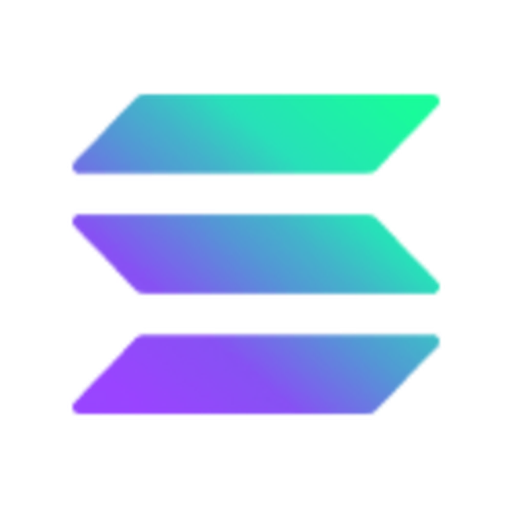Solana vs My Neighbor Alice – Price, Market Cap & Performance Compared
Which coin performs better – Solana or My Neighbor Alice?
We compare the current price (211.95 $ vs 1.57 $), market cap (115 139 188 576 vs 145 624 120) and all-time high (293.31 vs 40.93).
Find out which one stands out right now!
Solana is currently trading at 211.95 $, while My Neighbor Alice stands at 1.57 $. These cryptocurrencies differ not only in price but also in market presence.
The market cap of Solana is around 115 139 188 576, and My Neighbor Alice has about 145 624 120. Their respective all-time highs are 293.31 for Solana and 40.93 for My Neighbor Alice.
Daily trading volume and the 24h price change (-1.06296 % vs 4.04399 %) also offer key insights.
Compare all metrics now and see which coin fits your investment strategy best!
Solana
Solana is an advanced blockchain platform that has quickly gained traction due to its high-speed and low-cost transactions. Its architecture is designed to handle thousands of transactions per second, which positions it as a strong competitor in the decentralized finance space. As developers continue to build on its network, Solana is poised to support a diverse range of applications, making it a significant player in the cryptocurrency ecosystem.
more informationMy Neighbor Alice
My Neighbor Alice is an innovative blockchain-based game that combines the excitement of virtual real estate with play-to-earn mechanics, allowing players to buy, own, and trade virtual plots of land. The game uniquely blends the elements of social interaction and gaming, empowering users to create and manage their own farming and building projects within a colorful, cartoonish world. With its accessible approach, My Neighbor Alice aims to attract both seasoned gamers and newcomers to the crypto space, fostering a vibrant community around decentralized ownership.
more information

|

|
|
|
|
General Information |
|
|---|---|
|
Title
Solana
|
Title
My Neighbor Alice
|
|
Symbol
sol
|
Symbol
alice
|
|
Whitepaper
-
|
Whitepaper
|
|
Website
|
Website
|
|
Community
-
|
Community
-
|
|
Last Updated
2025-09-24 23:29
|
Last Updated
2024-12-15 23:59
|
Price Data |
|
|---|---|
|
Current Price $
211.95 $
|
Current Price $
1.57 $
|
|
High 24h
216.29 $
|
High 24h
1.58 $
|
|
Low 24h
206.33 $
|
Low 24h
1.46 $
|
|
Price Change 24h
-2.27718 $
|
Price Change 24h
0.06117 $
|
|
Price Change % 24h
-1.06296 %
|
Price Change % 24h
4.04399 %
|
Market Data |
|
|---|---|
|
Market Cap
115 139 188 576
|
Market Cap
145 624 120
|
|
Total Volume
8 426 373 441
|
Total Volume
19 434 015
|
|
Market Cap Change 24h
-1 726 644 361
|
Market Cap Change 24h
6 314 865
|
|
Market Cap Change % 24h
-1.47746 %
|
Market Cap Change % 24h
4.53298 %
|
|
Return on Investment (ROI)
-
|
Return on Investment (ROI)
-
|
Supply and Availability |
|
|---|---|
|
Circulating Supply
543 390 185
|
Circulating Supply
92 083 333
|
|
Total Supply
610 459 596
|
Total Supply
100 000 000
|
|
Max Supply
-
|
Max Supply
100 000 000
|
Historical Data |
|
|---|---|
|
All Time High (ATH)
293.31
|
All Time High (ATH)
40.93
|
|
ATH Change %
-27.78745 %
|
ATH Change %
-96.15029 %
|
|
ATH Date
2025-01-19 11:15
|
ATH Date
2021-03-15 08:54
|
|
All Time Low (ATL)
0.50080
|
All Time Low (ATL)
0.63755
|
|
ATL Change %
42 194 %
|
ATL Change %
147.14898 %
|
|
ATL Date
2020-05-11 19:35
|
ATL Date
2023-10-11 16:55
|
Solana
The Rise of Solana: A Deep Dive into the Blockchain Superstar
Solana (SOL) has emerged as one of the most prominent blockchain platforms in recent years, showcasing impressive growth and technological advancements. Known for its high-speed transactions and low fees, Solana has become a favorite among developers and investors alike. This article aims to explore the unique features of Solana, its historical performance, as well as its future prospects.
Key Features Setting Solana Apart
Solana's key selling point is its ability to process transactions at lightning speed compared to other blockchains. It utilizes a unique consensus mechanism known as Proof of History (PoH), which enables the network to handle thousands of transactions per second (TPS), a feat unmatched by many other blockchains. This innovation allows for scalability without compromising on speed or cost, making Solana an attractive option for decentralized applications (DApps) and decentralized finance (DeFi) projects. Additionally, the low fee structure further enhances its appeal in the crypto space.
Advantages of Solana
One of the main advantages of Solana is its scalability. As the demand for blockchain technology grows, the need for scalable solutions becomes more critical. Solana's architecture allows for rapid scaling, positioning it as a robust platform for future expansion. Furthermore, Solana boasts an active developer community that continuously contributes to its ecosystem, resulting in a diverse range of applications and services being built on the network. The high throughput and low transaction costs make it an ideal environment for developers, encouraging innovation across various sectors.
Challenges and Criticisms
No technology comes without its set of challenges, and Solana is no exception. One of the criticism often aimed at Solana is its level of decentralization. Critics argue that the network's reliance on a limited set of validators potentially undermines its decentralized ethos. Additionally, like other emerging technologies, Solana faced network outages in the past, raising concerns about its reliability and stability during high-stress periods of network activity.
A Look Back: Solana's Historical Performance
Solana's journey began in 2020 when it was introduced to the crypto world. Its price hit an all-time low (ATL) of $0.500801 in May 2020. The blockchain quickly garnered attention, and by November 2021, it reached an all-time high (ATH) of $259.96. Solana's price movements during these years reflect the broader market sentiment and growing interest in scalable blockchain solutions. Despite experiencing significant market volatility, including a notable price correction from its ATH, Solana has maintained a strong market presence.
Future Prospects of Solana
As we look to the future, Solana's prospects seem promising. Its growing ecosystem, coupled with continuous technological improvements, positions it well to capture a significant share of the blockchain market. The platform's focus on scalability and efficiency will likely drive more developers and projects to choose Solana as their preferred blockchain network. Furthermore, ongoing partnerships and integrations suggest a positive trajectory for Solana, allowing it to compete with other major blockchains in the years to come.
In conclusion, Solana represents a significant development in the crypto landscape, distinguished by its speed, scalability, and low-cost transactions. While the network faces inherent challenges that accompany any young and rapidly growing technology, the potential for innovation and adoption remains substantial. As Solana continues to evolve, it will undoubtedly be a crypto story worth following closely.
My Neighbor Alice
Exploring My Neighbor Alice: A Unique Blockchain Experience
My Neighbor Alice (ALICE) is an innovative blockchain-based game that merges elements of decentralized finance (DeFi) with the world of gaming. Released in March 2021, this play-to-earn platform allows players to purchase, own, and trade virtual land and assets using the native ALICE token. The game’s charm lies in its simplicity and accessibility, making it appealing to a broad audience, including those new to cryptocurrencies.
History and Market Performance
Since its launch, My Neighbor Alice has experienced dramatic price fluctuations, most notably reaching an all-time high (ATH) of $40.93 on March 15, 2021. This explosion in value can largely be attributed to the exploding interest in play-to-earn games and the broader DeFi market during that period. However, like many cryptocurrencies, ALICE has not been immune to market corrections, with its current price resting at approximately $1.11, representing a staggering drop of over 97% from its ATH.
Pros of My Neighbor Alice
1. Engaging Gameplay: The game offers an interactive experience that combines gaming with financial incentives, making it attractive for gamers and crypto enthusiasts alike.
2. Accessibility: My Neighbor Alice is designed to be user-friendly, allowing players, regardless of their prior knowledge of cryptocurrency, to easily join and play.
3. Play-to-Earn Model: The ability to earn while playing has become a significant draw for users, incentivizing continued participation and investment in the game.
4. Community Development: The game has a strong community focus, fostering a sense of belonging among players which can enhance user retention and engagement.
Cons of My Neighbor Alice
1. Market Volatility: The cryptocurrency market, including ALICE, is notoriously volatile. The significant price swings can be discouraging for potential investors.
2. Competitive Landscape: As the play-to-earn model gains traction, My Neighbor Alice faces competition from various other blockchain games, potentially diluting its user base.
3. Dependence on Broader Market Trends: ALICE's performance is heavily tied to the overall sentiment in the cryptocurrency market. Negative trends can significantly impact its value.
4. Regulatory Uncertainty: The evolving nature of regulations surrounding cryptocurrencies and gaming can pose risks to the project in the long run.
Future Outlook for My Neighbor Alice
Looking ahead, the future of My Neighbor Alice appears to hinge on several factors. Continued development within the game, such as new features and enhanced user experience, will be crucial. Additionally, expanding partnerships and collaborations with other blockchain projects could further solidify its position within the market.
The game's potential to tap into new audiences through innovative marketing strategies and community engagement initiatives is significant. If the market conditions align and user interest persists, My Neighbor Alice might once again capture the attention of players and investors alike, possibly leading to a resurgence in its value. However, the unpredictable nature of the cryptocurrency market necessitates caution from potential investors.
For those interested in delving deeper into the project, the official website and the whitepaper provide comprehensive insights into the game's mechanics, vision, and long-term strategy.

